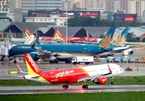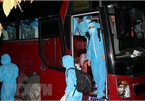 |
|
|
In the early days of 2022, international flights are being gradually resumed. But there has been low flight frequency.
Statistics from the Civil Aviation Authority of Vietnam show that, in the first seven days of resumption of regular international flights, a total of 64 passenger flights arrived in Vietnam, carrying 7,847 passengers. Of these, there were only 18 commercial flights.
After one week of restoring international routes, air carriers have pointed out inadequacies. Firstly, passengers have to make entry declaration on IGOVN, an application of the Ministry of Public Security, and a medical declaration on the PC-Covid application. Some provinces have their own regulations, for example, while Ho Chi Minh City requires a declaration on antoan-covid.tphcm.gov.vn.
Making a declaration on many applications makes it difficult for them, especially for foreigners. Airlines have suggested using a single application.
In addition, passengers from countries with Omicron must undergo a quick test before boarding and after leaving aircraft. Most airlines said this regulation makes it difficult for passengers because they have to perform covid tests many times. Passengers are not sure whether to test at home or go to the airport to do it at a designated medical facility.
Meanwhile, some foreign airports do not provide rapid pre-flight testing service, and the cost for rapid testing at some airports is very high. For example, in Japan, it can cost up to 270 USD per test.
Vietnam Airlines has reopened regular commercial routes carrying passengers to Vietnam from seven markets, including the US (4 flights/week), Japan (3 flights/week), South Korea (2 flights/week), Taiwan (1 flight/week), Singapore (2 flights/week), Thailand (2 flights/week), and Cambodia (4 flights/week).
Vietjet has resumed regular flights to Japan with a frequency of one flight/week and is expected to add more flights in the near future. International air routes connecting Hanoi and Ho Chi Minh City with Taipei (Taiwan, China), Singapore, Thailand and South Korea have also been resumed by Vietjet.
Bamboo Airways has opened a regular route from Taiwan - Noi Bai (Hanoi) from January 6 with 2 flights/week.
According to the Civil Aviation Administration of Vietnam, 7 of 9 countries and territories have agreed to Vietnam's proposal on the plan to resume regular flights, including the United States, Japan, Singapore, Cambodia, Thailand, Taiwan (China) and South Korea.
Although South Korea agreed with Vietnam's proposal to operate regular international flights with four flights per week each way, its aviation authorities said that due to regulations on epidemic prevention, this country is restricting incoming commercial flights.
The frequency of flights of Vietnamese airlines from Vietnam to South Korea is restricted with only 2 flights/week, while Korean airlines are allowed to operate 21 flights/week. The Civil Aviation Administration of Vietnam is coordinating with airlines to discuss with the Korean side to reach an agreement on a suitable plan for airlines of both sides.
Another shortcoming mentioned by airlines is the isolation procedure for passengers who are not fully vaccinated. According to regulations, passengers entering the country who are unvaccinated or are not fully vaccinated will have to present a certificate of eligibility for home quarantine when performing check-in procedures. Otherwise, they have to show a hotel room booking confirmation of at least seven days.
According to the Civil Aviation Authority of Vietnam, passengers returning to Vietnam in early 2022 are mainly overseas Vietnamese families who are returning home for the Lunar New Year (Tet). Many families have unvaccinated children. It is difficult from abroad to get a certificate of eligibility for home quarantine from the local People's Committee. If they want to be quarantined at the hotel, they must also have a booking certificate, which also causes difficulties.
 |
|
|
The Ministry of Transport has asked the Government and the Ministry of Health to consider removing the regulation on rapid testing for Covid-19 before and after boarding. According to regulations, passengers entering Vietnam had to have a negative PCR test.
Furthermore, performing quick testing for passengers after landing at airports, when regular international flights increase, can lead to congestion at the airport, and the risk of spreading the virus. In fact, the Civil Aviation Authority of Vietnam had to move combo flights to land at a number of airports other than Tan Son Nhat and Noi Bai to avoid congestion at the two gateway airports.
The regulations on pre-flight PCR testing therefore should be uniformly applied in accordance with international practices so that passengers do not have to undergo quick testing before boarding and after leaving the airplane.
In addition, the Ministry of Public Security needs to coordinate with the Ministry of Health and the Ministry of Foreign Affairs to develop a bilingual website in English and Vietnamese so that foreigners, airlines and foreign organizations can look up and find information on health regulations, and procedures for entry and exit of Vietnam.
As for quarantine procedures for passengers who have not received full vaccines (mainly children), the Civil Aviation Authority of Vietnam has asked the Ministry of Health to give guidance to localities on publishing a list of hotels eligible for quarantine, so that passengers can book rooms easily.
Currently, passengers entering Vietnam must have a negative PCR test. Persons entering the country who are fully vaccinated or have recovered from the disease will be isolated at home for three days. If they have not been vaccinated or fully vaccinated, they will be isolated at the place of residence for seven days.
Countries have their own epidemic prevention regulations based on the disease situation. In Korea, Japan, Australia, Europe and America, it is important for airlines to promptly update information for passengers, and avoiding reopening and then suspending again, which is costly and causes damage to the economy.
In the long term, in order to reopen international routes, it is not advisable to limit the kinds of passengers and purpose of international visitors to Vietnam, said General Secretary of the Aviation Business Association Bui Doan Ne.
Passengers should only be required to have a valid visa and passport, and fully meet the requirements for pandemic prevention and control under Vietnam's regulations to be able to fly to Vietnam, Ne added.
Vu Diep

It’s time to stop ‘rescue’ flights: experts
Vietnam has reopened 10 international regular air routes and the Civil Aviation Authority of Vietnam (CAAV) has agreed to increase the number of routine flights. Experts have said it is now time to stop rescue flights.

More flights to be launched to bring overseas Vietnamese home: spokesperson
The Ministry of Foreign Affairs will continue its coordination with other ministries, agencies, localities and airlines to arrange flights to bring overseas Vietnamese back to Vietnam as per their wish.